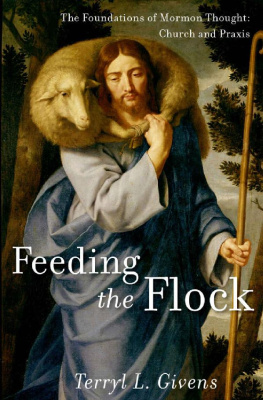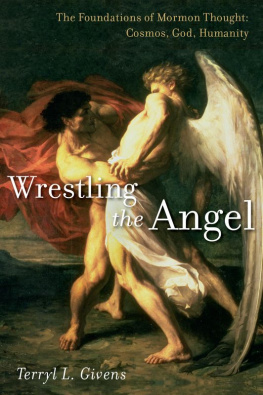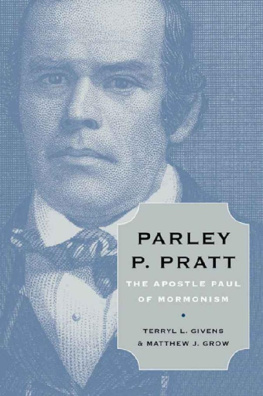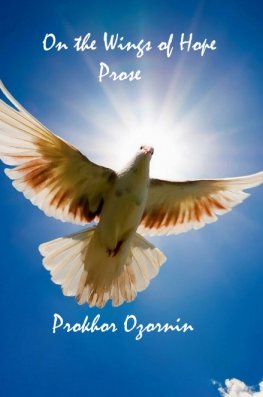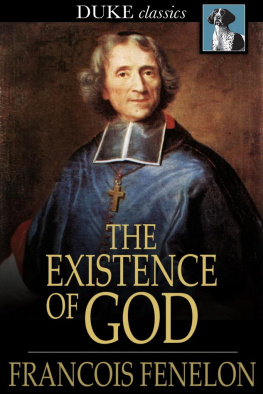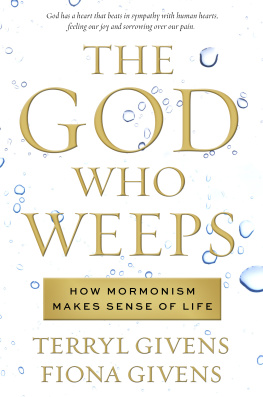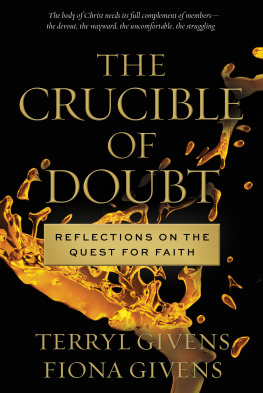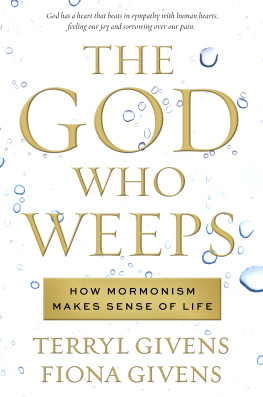When Souls Had Wings
When Souls Had Wings
Pre-Mortal Existence in Western Thought
TERRYL L. GIVENS


Oxford University Press, Inc., publishes works that further Oxford Universitys objective of excellence in research, scholarship, and education.
OxfordNew York
AucklandCape TownDar es SalaamHong KongKarachi
Kuala LumpurMadridMelbourneMexico CityNairobi
New DelhiShanghaiTaipeiToronto
With offices in
ArgentinaAustriaBrazilChileCzechRepublic FranceGreece
GuatemalaHungaryItalyJapanPolandPortugalSingapore
South KoreaSwitzerlandThailandTurkeyUkraineVietnam
Copyright 2010 Oxford University Press, Inc.
Published by Oxford University Press, Inc.
198 Madison Avenue, New York, NY 10016
www.oup.com
First issued as an Oxford University Press paperback, 2012.
Oxford is a registered trademark of Oxford University Press
All rights reserved. No part of this publication may be reproduced, stored in a retrieval system, or transmitted, in any form or by any means, electronic, mechanical, photocopying, recording, or otherwise, without the prior permission of Oxford University Press.
Library of Congress Cataloging-in-Publication Data
Givens, Terryl.
When souls had wings: pre-mortal existence in Western thought / by Terryl L. Givens.
p. cm.
ISBN 978-0-19-531390-1 (hardcover); 978-0-19-991685-6 (paperback)
ebook ISBN 978-0-19-091448-6
1. Soul. 2. Pre-existence.
I. Title.
BL290.G58 2009
129dc22
2009007369
9 8 7 6 5 4 3 2 1
Printed in the United States of America on acid-free paper
To Fiona, with whom the primordial wound disappears
Contents
The Chaldeans represent the Soul as originally endowed with wings, which fall away when it sinks from its native element, and must be reproduced before it can hope to return. Some disciples of Zoroaster once inquired of him, How the wings of the Soul might be made to grow again?By sprinkling them, he replied, with the Waters of Life.But where are those Waters to be found[?] they asked. In the Garden of God, replied Zoroaster.
Thomas Moore
So long as its wings are in perfect condition it flies high, but a soul that sheds its wings wanders until it lights on something solid, where it settles and takes on an earthly body, which then, owing to the power of this soul, seems to move itself. The whole combination of soul and body is called a living thing, or mortal.
Plato
So long as a soul continued to abide in the good it has no experience of union with a body. But by some inclination towards evil these souls lose their wings and come into bodies.
Origen
In Michelangelos Sistine masterpiece, the right hand of God extends majestically yet languorously to imbue the newly formed Adam with the gift of life, the divine finger touching, but not quite touching, mortal

Creation of Adam (1512, detail), by Michelangelo Buonarroti, Scala/Art Resource, New York.
When Souls Had Wings
And this is
Life?Toil! and wherefore should I toil?because
My father could not keep his place in Eden?
What had I done in this?I was unborn:
I sought not to be born.
Lord Byron,
Cain , act 1, scene 1
If there is one assertion that every disgruntled mortal seems safe in making, it is the petulant insistence, I didnt ask to be born. Birth has, in the West at least, usually been seen as the result of forces that operate entirely independently of what those forces produce. Whether engendered by spontaneous passion or parental planning, and viewed as the consequence of strict biological laws or a divine procreative powerit has seemed self-evident to generation after generation of humanity that newborns are the passive objects of anothers will, springing into being at someone elses behestor careless instigationset naked and miserable upon the shores of this great ocean of the world.
In this version of events, most people have generally assumed that the human individual comes into existence at the time of birth as, in the Judeo-Christian tradition at least, a combined physical body and immaterial soul or spirit.it may be, provides a generally sufficient explanation of how our body comes to exist. (Though even here, delightful variations exist that ascribe, for example, the simultaneous physical presence of all future generations in miniscule form in the eggs of Eve or the sperm of Adam.) The origins of the soul, however, have been subject to rather more speculation. This would seem to be inevitable, given the immediate problem that emerges: the logic of physical parents producing physical progeny becomes complicated when those physical parents are considered to produce offspring possessed of an immortal and nonphysical dimension as well. The procreation of physical bodies is relatively straightforward. How and when a spirit is created and joined to that body is more problematic.
In early Christian thought, two theories evolved to resolve this conundrum. The spirit or soul was held to be either generated from the parents in the same way as the body (traducianism), or it was believed to be formed by a special act of creation on Gods part for each and every individual (creationism). Traducianism (from the Latin tradux , shoot or sprout; traducere , convey or lead across) can be traced at least to the church father Tertullian (b. 160) and was later embraced by the Eastern Orthodox Church and Luther. Since Adam begat a son in his own likeness and image (Gen. 5:3), and since he comprised a body and soul, then begetting a combined body and soul appears to be compatible with, if not clearly indicated by, Holy Writ.
Before the term was co-opted to refer to biblical literalists in the aftermath of Darwin, creationism was an alternative version of the souls creation. Creationism was perhaps first taught by the African apologist Lactantius (245325 CE) and by the Middle Ages was being proclaimed by prominent church teachers. The theory relies principally upon the biblical account of Adams creation, at which time the spirit was infused or breathed into a body prepared for it. Creationism came to be embraced by the majority of early church authorities. This view avoids the metaphysical difficulties of how spirit and body interact in the human individual to jointly sire a combined body and spirit. At the same time, the doctrine reserves to God alone the capacity to produce that which is immortal. Catholics (like most Protestants) subscribe to creationism, based on their belief that the human soul is simple and indivisible, hence it cannot generate spiritual germs or seed; and the body, being physical, cannot generate that which is spiritual.
Both doctrines are encumbered with profound theological problems. If the soul originates with the body, as the traducianists hold, then why does it not perish with the body? In what manner can a human be thought capable of generating a soul? Creationism presents, if anything, even more intractable problems. If God creates the soul afresh in every human, how can it be imperfect, as a soul of fallen nature necessarily is? If it is created pure and innocent, how and when does it come to acquire the burden of Adams sin and guilt? And what justice can there be in immediately consigning a purely created spirit to the incubus of guilt, sin, and fallenness?


